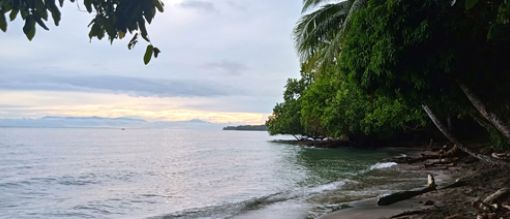On Wednesday November 09, Indigenous Huon Gulf advocate, Jotham Keleino, attended the Newcrest Mining AGM in Melbourne, Australia, on behalf of thousands of community members across Papua New Guinea who have not given free and prior informed consent to the Wafi-Golpu project.
The Australian companies, Newcrest Mining and Harmony Gold are partners in a collective project, the Wafi-Golpu Joint Venture. The Wafi-Golpu gold and copper mine is an advanced exploration project that, if approved in its current form, is set to be one of the largest mines to ever be approved in Papua New Guinea.
Jotham demanded that the company explain why it is continuing to proceed in the Wafi-Golpu mine project when they have failed to act in due process in both consent and environmental assessment procedures.
On that same Wednesday, 2,596 people from 185 villages across Lae and surrounds signed and filed a Human Rights complaint with the Australian OECD National Contact Point against Newcrest Mining and Harmony Gold – the two Australian based mining companies who are due to have a Special Mining Lease signed on December 02, 2022.
What is the Core Community Concern?
At the core of community concerns is the lack of consent for the mine, and the proposed 130 km pipeline that is planned to carry 360 million tonnes (or more than 1 trillion litres) of toxic mining waste to the Huon Gulf ocean in a method known as ‘Deep Sea Tailings Placement’ - DSTP. The use of Deep Sea Tailings Placement (DSTP) is not legal in Australia, and is used by only 15 mines in the world.
The mining waste is proposed to be transported through the earthquake-prone city of Lae, across floodplain-prone agricultural lands such as near Wagang Village. With a lack of research into the risks associated with potential pipeline failure, the companies are continuing with the gamble that could cause environmental destruction and chemical contamination of the rivers, food and water sources, agricultural sites, and sacred sites along the DSTP pipeline and the outfall area. It can result in loss of human life.
What Question Was Asked At The AGM?
Jotham asked: “Your own independent expert, professor Ralph Mana has criticised the DSTP proposal for the Wafi Golpu project with particular concerns about the limited baseline information available. Dr. Mana questions the claims, the claim that 60% of the tailings will reach the Markham Canyon. Indeed, he says that as little as 10% of the tailings may reach that point.
The Huon coast have not been given adequate information and is still strongly disagreeing with the use of DSTP.
Today. 2,596 members from UNGF community signed a complaint to the Australian. National contact point on the OECD guidelines for multinational enterprises. Expressing these very concerns, Will you halt all approvals and development of the project until we can come up with a process of negotiation for the project that respects the signs in our right to give or withhold free prior and informed consent? “
What did Newcrest Say At The AGM?
Newcrest Mining representatives said “we've been looking at the appropriate tailings option for Wafi Golpu for well over 10 years… We looked at 45 different locations, narrowed it down to three or four and then did extensive work, which showed that in essence, the issues about terrestrial things are the rainfall.
It's a highly seismically active area. There's disturbance of land in relation to cultural heritage in terms of the environment. So these combinations in each and every one of those examples prove that it [open-pit mining] is not the right thing to do. So, the lowest risk to, in all these areas - environment, people, social cultural heritage - is the DSTP option.”
They also said that the “silt that comes down the Markham River… Is not dissimilar to the tailings, that we would put 200 metres down in the ocean.”
“We've done extensive offshore surveys using specialist ships, monitoring life at various levels, measuring velocities, to prove that the science actually fits the application… And extensive consultations, since 2016, with the affected communities up and down the pipeline…”
“We take it very seriously, and we're confident this is the right solution and of course, those discussions are taking place all the time and we're happy to again, put our views forward and then the science for people to look at.”
What Does This Mean?
Attending the AGM was an opportunity to have the voices of communities heard in a corporate forum, with the company representatives who are in charge of and own the Wafi-Golpu Project. It is also an opportunity to hold the company accountable to their shareholders and consumers by asking direct questions in an open forum: This can put pressure on them to answer the difficult question in a recorded and international setting, and to be transparent about their operations.
For the No Wafi Golpu DSTP campaign, and the communities who are at risk of being impacted by the Wafi-Golpu mine, attending the Newcrest Mining AGM was an opportunity to impact the social license of Newcrest Mining - so that their shareholders know that communities do not consent to the project.
“You’re looking at a situation where there are thousands of people along the Huon Gulf that depend on the ocean for their everyday lives, and if you take away that environment - if the environment is too devastated for them to make an income - what are they going to do?”
– Emily Mitchell, Research Director, Jubilee Australia Research Centre
